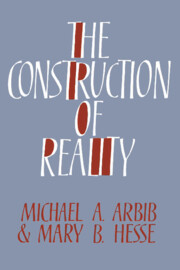Book contents
- Frontmatter
- Contents
- Preface
- Chapter 1 Posing the problem
- Chapter 2 The intelligence of the artificial
- Chapter 3 Schema theory
- Chapter 4 Relating mind and brain
- Chapter 5 Freedom
- Chapter 6 Freud on psychology and religion
- Chapter 7 Schemas: from the individual to the social
- Chapter 8 Language, metaphor, and a new epistemology
- Chapter 9 Interpretation and reality
- Chapter 10 Religions as social schemas
- Chapter 11 The Great Schema
- Chapter 12 Secular schemas
- References
- Author index
- Subject index
Chapter 7 - Schemas: from the individual to the social
Published online by Cambridge University Press: 22 September 2009
- Frontmatter
- Contents
- Preface
- Chapter 1 Posing the problem
- Chapter 2 The intelligence of the artificial
- Chapter 3 Schema theory
- Chapter 4 Relating mind and brain
- Chapter 5 Freedom
- Chapter 6 Freud on psychology and religion
- Chapter 7 Schemas: from the individual to the social
- Chapter 8 Language, metaphor, and a new epistemology
- Chapter 9 Interpretation and reality
- Chapter 10 Religions as social schemas
- Chapter 11 The Great Schema
- Chapter 12 Secular schemas
- References
- Author index
- Subject index
Summary
A multilevel view of schemas
In discussing scientific knowledge in Chapter 1, we saw that scientific theories are testable and mutable and that changes yielding increasing pragmatic success may be accompanied by radical changes in the ontology posited to underlie the observable phenomena. We have based our epistemology on a schema theory with a similar quality. Our schema assemblages are not the precise formal statements of scientific explanation and observation; but they do allow us to make sense of our world, to plan courses of action, and yet to change the schemas (not necessarily consciously) when the expectations they support fail to be met.
There is a paradox at the heart of this chapter – the paradox of the individual actor discovering that much personal individuality appears to be the playing out of social forces. In this chapter, we come to a transition. The last five chapters emphasize schemas as units of cognition within the head of the individual; the next four chapters turn from psychology to the sociology of knowledge. They gather insights from philosophy of language, from social anthropology, and from hermeneutics to develop an account of social schemas that act as a reality external to the individual members of a society. These chapters culminate in the presentation in Chapter 11 of the Biblical worldview as a “Great Schema” that locates human reality in a God reality transcending space and time.
- Type
- Chapter
- Information
- The Construction of Reality , pp. 127 - 146Publisher: Cambridge University PressPrint publication year: 1986

